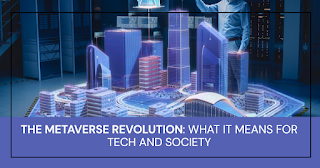The Metaverse Revolution: What It Means for Tech and Society
Introduction:
Imagine a digital universe where reality seamlessly blends with virtual realms, a place where you can work, play, socialize, and create like never before. Welcome to the Metaverse—a concept that has transcended science fiction and is becoming a reality. In this article, we'll embark on a journey to explore the Metaverse, its technological underpinnings, its implications for society, and the ways it's reshaping the future of tech.
What Is the Metaverse?
The Metaverse is a collective virtual shared space, created by the convergence of virtually enhanced physical reality and digital spaces. It's an immersive, interconnected digital universe where users can interact with each other and digital environments in real-time. The Metaverse blurs the lines between the physical and digital worlds, offering limitless possibilities.

The Building Blocks of the Metaverse:
-
Virtual Reality (VR) and Augmented Reality (AR):
VR and AR technologies provide the foundation for the immersive experiences within the Metaverse. VR creates entirely digital environments, while AR overlays digital elements onto the real world.
-
Blockchain and Digital Ownership:
Blockchain technology ensures digital assets within the Metaverse are unique, secure, and can be owned by users. It's the backbone of digital ownership and transactions.
-
Artificial Intelligence (AI):
AI powers the intelligent agents and NPCs (non-player characters) that populate the Metaverse, making interactions more realistic and dynamic.
-
3D Modeling and Simulation:
3D modeling and simulation technologies create the visual and interactive aspects of the Metaverse, allowing for lifelike representations of spaces and objects.
Implications for Society:
-
Remote Work and Collaboration:
The Metaverse is reshaping the way we work. Virtual offices and meeting spaces allow for global collaboration without physical constraints.
-
Education and Training:
Learning becomes immersive and interactive. From virtual classrooms to hands-on training simulations, the Metaverse transforms education.
-
Entertainment and Social Interaction:
Virtual concerts, gaming, and social gatherings in the Metaverse provide new avenues for entertainment and connection.
-
Economy and Commerce:
The Metaverse introduces a digital economy where users can buy, sell, and trade virtual assets, creating new business opportunities.
Challenges and Considerations:
-
Privacy and Security:
With increased digital presence, ensuring user privacy and cybersecurity is paramount.
-
Digital Divide:
Access to the Metaverse may exacerbate existing inequalities, raising questions about inclusivity.
-
Content Regulation:
The Metaverse presents challenges in regulating content and ensuring safe and ethical use.
Conclusion:
The Metaverse is no longer a distant dream; it's emerging as a transformative force in technology and society. Its impact spans industries, revolutionizing how we work, learn, socialize, and do business. As we navigate this uncharted territory, it's crucial to strike a balance between innovation and responsible use, ensuring that the Metaverse benefits humanity as a whole. The journey into the Metaverse has begun, and its possibilities are limited only by our imagination and our ability to harness technology's potential for the betterment of society.

Comments
Post a Comment